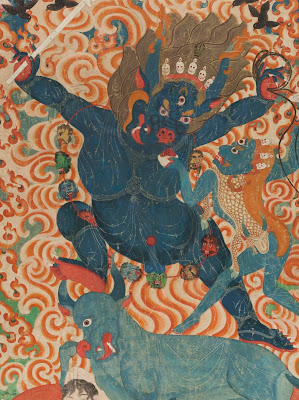Reading Notes: The Yoga Trap
Yoga...
-Hindu or Indian, secular or religious?
-These are Euro-American terms, so who cares!
-Indians are "expected to force fit Indian thoughts, like a twisted yogic asana"
-Hindu: YES, because Hindu texts continually refer to this word
-Krishna and Shiva are both referred to as yogeshwara, meaning lord of yoga
-Indian: YES, because yoga originated in the Indian subcontinent
-Thrived in various schools of thought, including Hinduism, Jainism, and Buddhism
-Fun fact: "zen" in Japanese Buddhism can be traced to "dhyana" (profound meditation)
-Religious: YES, because it refers to the idea of God
-Speaks to the union of the individual soul with the cosmic soul
-Secular: YES, because divine ideals are a very small component of Yoga Sutra
-A tool to "uncrumple the mind"
-The eight practices: social disengagement (yama), personal discipline (niyama), postures (asana), breath (pranayama), sensory isolation (pratyahara), awareness (dharana), attention (dhyana) and withdrawal (samadhi)
-In the West, the "physical aspect of yoga has become more important than the psychological aspects"
-These aspects become spiritually twisted as "new age" and hippie"
-Other religions reject the religious undertones of yoga, and the West has therefore tried to separate yoga from its religious roots
~~~
-Hindu or Indian, secular or religious?
-These are Euro-American terms, so who cares!
-Indians are "expected to force fit Indian thoughts, like a twisted yogic asana"
-Hindu: YES, because Hindu texts continually refer to this word
-Krishna and Shiva are both referred to as yogeshwara, meaning lord of yoga
-Indian: YES, because yoga originated in the Indian subcontinent
-Thrived in various schools of thought, including Hinduism, Jainism, and Buddhism
-Fun fact: "zen" in Japanese Buddhism can be traced to "dhyana" (profound meditation)
-Religious: YES, because it refers to the idea of God
-Speaks to the union of the individual soul with the cosmic soul
-Secular: YES, because divine ideals are a very small component of Yoga Sutra
-A tool to "uncrumple the mind"
-The eight practices: social disengagement (yama), personal discipline (niyama), postures (asana), breath (pranayama), sensory isolation (pratyahara), awareness (dharana), attention (dhyana) and withdrawal (samadhi)
-In the West, the "physical aspect of yoga has become more important than the psychological aspects"
-These aspects become spiritually twisted as "new age" and hippie"
-Other religions reject the religious undertones of yoga, and the West has therefore tried to separate yoga from its religious roots
Standing splits pose. Personal photo.
~~~
Bibliography:
The Yoga Trap.




Comments
Post a Comment